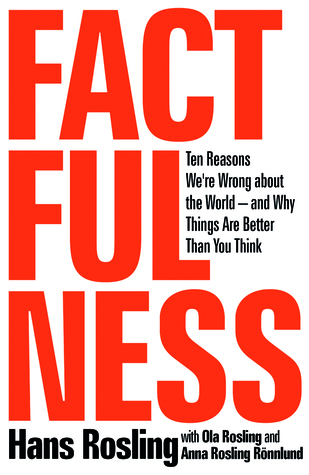
Factfulness
Ten Reasons We're Wrong About the World—and Why Things Are Better Than You Think
فرمت کتاب
ebook
تاریخ انتشار
2018
Lexile Score
1000
Reading Level
5-7
نویسنده
Ola Roslingناشر
Flatiron Booksشابک
9781250123817
کتاب های مرتبط
- اطلاعات
- نقد و بررسی
- دیدگاه کاربران
نقد و بررسی

An influential thought leader puts a positive spin on global awareness.In his posthumous collaborative book poised to "fight devastating ignorance with a fact-based worldview," Swedish physician, global health lecturer, and academic statistician Rosling (1948-2017) parts the dingy curtains of global pessimism to reveal an alternate and uplifting perspective on the state of world issues today. Co-written with Rosling's son and daughter-in-law, the book effectively educates, uplifts, and reassures readers through chapters reinforced by focused, statistically sound research studies. Rosling presents 10 theoretical concepts, or "instincts," which are basic human impulses that often cause the general public to misinterpret and hyperbolize critical information about the contemporary world. Among the behaviors he cites that drive people to manifest an "overdramatic worldview" are the tendency to divide everything into two aspects ("us vs. them," the "developing" vs. the "developed" world), blaming one indicator for a myriad of troubles, and cultivating a negative mindset. Adding to the dynamically designed presentations of charts, images, data analysis, and personal anecdotes, the author also breaks up his succinct chapters with humor and common-sense reasoning bolstered by statistical data. Multiple choice questions on world knowledge are sure to surprise and enlighten readers curious about their own awareness levels and susceptibility to rush judgments, misconceptions, and defeatist mindsets. With unfailing optimism, Rosling administers a fact-based antidote to apocalyptic statistics like world population overgrowth, rampant infant deaths, and soaring crime rates, none of which are ballooning out of control but are fearfully perceived as such. He also examines five pressing real-world "risks" that demand attention: poverty, global warming, financial collapse, global pandemic, and a catastrophic third world war. In compelling readers to comprehend the positive aspects of world changes using practical thinking tools, Rosling delivers a sunny global prognosis with a sigh of relief.An insistently hopeful, fact-based booster shot for a doomsaying, world-weary population.
COPYRIGHT(2018) Kirkus Reviews, ALL RIGHTS RESERVED. (Online Review)

April 1, 2018
Sure to grab attention with its catchy subtitle, this book by the late academic, statistician, and TED Talk star explains in plain prose how and why the most intelligent among us hold mistaken beliefs about important worldwide issues like poverty, education, population, demographics, health, and the environment. This is no academic treatise; Rosling uses simple charts and graphs to turn years of data into easily understandable evidence that contradicts erroneous mainstream ideas about overpopulation, undereducation of women in developing countries, vaccinations among the poor, the lethality of natural disasters, and climate change. In an accessible, almost folksy prose, Rosling identifies various reasons why so many of us have ended up with so many faulty ideas about our world. These reasons are the crux of the book and cannot be reduced to aphorisms, but they involve issues like negativity, fear, generalization, blame, urgency, and destiny. Each chapter ends with a page of bullet-point summaries and motivational advice for the future. His final advice is to teach our children humility, curiosity, and a fact-based worldview. Recommended for all libraries.(Reprinted with permission of Booklist, copyright 2018, American Library Association.)

























دیدگاه کاربران